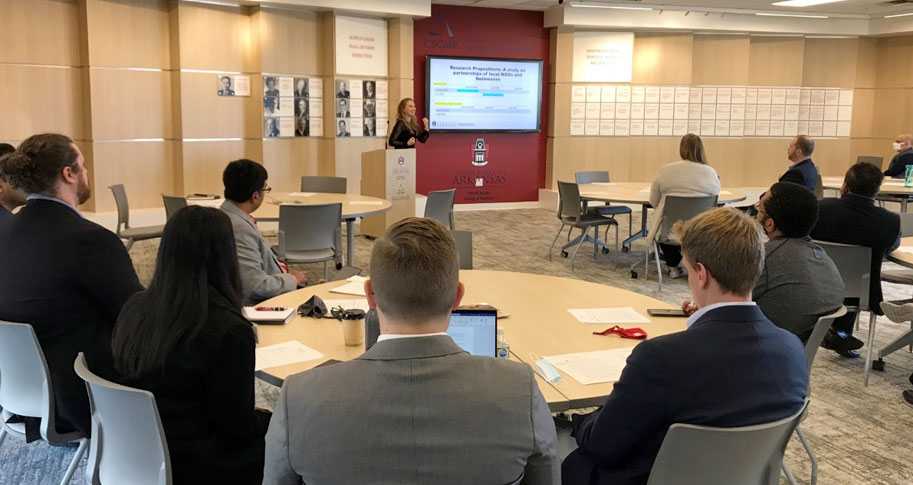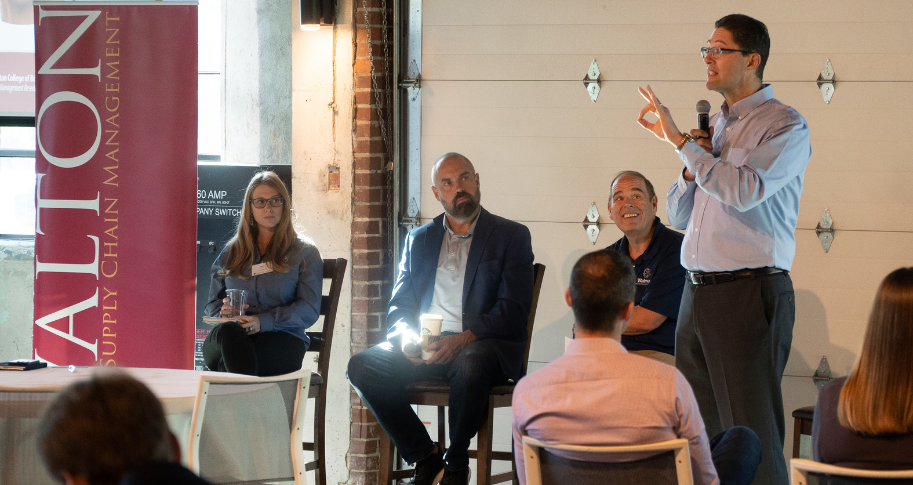
On Friday, November 5th, 2021, the SCMRC hosted the 3rd Annual Emerging Research Symposium. This event is a one-of-a-kind program that brings industry together with the faculty of the Walton Supply Chain program to learn about current and ongoing research being pursued. Through research presentations, industry provide insights that help our faculty tailor their research for maximum industry impact, while inviting collaborative opportunity where industry can provide data & resources to complement the research.
Following are the research briefs that were shared during the symposium! Our faculty and doctoral students invite your outreach to learn more about their research and to explore partnerships where applicable. The lead researchers email address is noted within their respective research brief.
Avoiding Late Orders: The Roles of DC Operations and Transportation in Online Retailing
Online retailers actively manage order fulfillment and logistics processes to ensure on-time deliveries, yet still some orders are late. We analyzed over 12,000 orders during a three-year period from an online retailer to explain how fulfillment and logistics performance can mitigate late orders and how these relationships are contingent upon the order complexity.
Presented By:
- Nicolò Masorgo, Doctoral Student, Walton SCM (NMasorgo@walton.uark.edu)
- Faculty Advisors: David Dobrzykowski, Adriana Hofer
Strengthening Partnerships and the Benefits of Crises
Organizational relationships go through stages which can strengthen or weaken them. In supply chains, we expect for organizational relationships to be strengthened over time, especially for partners that need each other. However, unfortunate events, crises and surprises do occur. How the relationship changes depend on how the parties react and adjust their expectations and to the challenges. In this study, we explore how different types of organizations and different types of crises affect relationships.
Presented By:
- Iana Sheehan, Assistant Professor, Walton SCM (IShaheen@walton.uark.edu)
Not Picking Up What You’re Putting Down: Drivers and Determinants of Shipper of Choice Status
As driver, equipment and market dynamics drive capacity and rate volatility, freight markets have progressively evolved to confer significant decision-making power to carriers and their drivers regarding the shippers they choose to work with and the loads they have preferences for. This dynamic has often resulted in instances where some shippers’ freight isn’t prioritized or picked up at all, having adverse implications for shipper operating and financial performance. The emerging trend of gaining shipper of choice status amongst carriers has therefore become a focus and priority of many shippers. In this study we examine the shipper firm-level and load-level characteristics that influence the attainment of shipper of choice status and explore the factors that can change the importance that carriers assign to these characteristics. Findings of the study will bear significant implications for shipper capability-investment and operations improvement programs.
Presented By:
- Marc Scott, Assistant Professor of Practice, Walton SCM (MScott@walton.uark.edu)
What? Not All Merchants Are Evil? What Helps and Hinders Retailer-supplier Innovation?
This research done in partnership with SCMRC member input focused on how retail buyers help and hinder supplier innovation. It develops types of retailer – supplier innovation models and considers behavior that accelerates and degrades supplier innovation efforts.
Presented By:
- Remko van Hoek, Clinical Professor, Walton SCM (RVanHoek@walton.uark.edu)
On Shelf Availability and Preferences for Omnichannel Fulfillment
As supply chain failures dominate the news cycle, consumers face stockouts more now than ever before. To understand how consumers respond to stockouts, we use retail data to assess which product categories consumers will and will not select a substitute. We seek to understand the factors that are important to omnichannel consumers when selecting a fulfillment channel. Our ongoing and future research will identify factors in the decision tree that drive consumers towards or away from fulfillment channels.
Presented By:
- Rob Jensen, Doctoral Student, Walton SCM (RJensen@walton.uark.edu)
- Faculty Advisor: John Aloysius
Models and Humans: Supply Chain Analytics and the Evolving Work of Supply Chain Managers
Supply chain management is in a period of transformation due to big-data, analytics, automation, and machine learning. Despite these technology-driven changes, people remain at the heart of the supply chain processes. Our research reveals managers attitudes towards analytics pre/post covid as well as best practices.
Presented By:
- John Aloysius, Professor, Walton SCM (JAloysius@walton.uark.edu)
- Bekki Brau, Assistant Professor, Brigham Young University (Walton SCM Doctoral Graduate) (bekki_brau@byu.edu)





